费正清《Trade and diplomacy on the China coast
晚清对外关系中的“一个外交两种体制”局面初探

晚清对外关系中的“一个外交两种体制”局面初探A Study on the One Diplomacy Two System in Late Qing Dynasty's Foreign Relations权赫秀(韩国学中央研究院)摘要:晚清时期在对外关系领域,不仅在事实上确曾存在着传统与近代两种不同体制的外交关系共存的客观现象,而且在制度层面负责处理对西方国家近代条约关系之新型机构与主管对周边朝贡国家关系事务的传统对外关系机构也曾至少共存半个世纪以上。
在朝贡关系体制的边缘亦即周边朝贡国家如近代韩国,也曾出现极为类似的所谓“两截体制”局面与制度。
可以说,“一个外交两种体制”在晚清时期不仅是在朝贡关系体制的中心与边缘内外普遍存在的一个客观现象与事实,而且也是清政府统治集团在对外关系制度层面非制度性地因应上述客观变化现实的结果,其本质上则不过是晚清对外关系实现近代转型过程中所出现的一个过渡性现象与特征。
关键词:晚清、对外关系、近代化、过渡、一个外交两种体制按照美国学者费正清的说法,朝贡关系体制不仅是历史上中国与周边国家关系的基础,而且还是近代中国与欧美国家关系的依据。
1正因为如此,有关中国古代朝贡关系的研究,不仅成为古代中国对外关系研究的一个重要内容,同时也是近代中国对外关系史研究的一个重要领域。
2从近代化的视角而言,中国近代历史无疑就是一个由传统(或前近代)向近代的一个转变过程,对外关系领域自然也不能例外。
近人刘锦藻在《清朝续文献通考》一书中,就曾明确指出近代以前的中国对外关系不过是“(中国)自抚其藩属,非外交也。
”3 无独有偶,“根据欧美学者一般的说法,在鸦片战争及南京条约签订以前,中国是没有所谓‘现代的外交关系’的,因为传统中国没有用西方的国际公法处理对外关系,也没有派外交使节到别的国家去。
”4于是,“条约代替朝贡制度”5被认为是中国历史近代化过程的一个重要内容,一部中国近代外交史被记述为中国对近代国际关系的抗拒及适应的过程,亦即中国被迫放弃朝贡制度并逐步接受西方外交制度的过程。
费正清思想在中国的译介和接受研究

DOI: 10.14092/11-3956/c.2020.06.013费正清思想在中国的译介和接受研究赵慧芳1,刘晓峰2(1. 西安外国语大学 英文学院,陕西 西安 710128;2. 西安外国语大学 外国语言文学研究中心,陕西 西安 710128)摘 要:费正清(John King Fairbank )是美国最负声望的中国问题专家,一生致力于中国问题研究,出版了大量涉及中国历史、政治、战争、改革、文化方面等重要话题的著作。
他的思想推动了海外对中国研究由传统汉学角度向近现代中国视角转变,代表着美国主流社会对中国问题的看法。
从70年代开始,费正清著作陆续译入中国,国内学术界一直重视对其思想的研究。
然而,翻译界对其著作在中国的译介和接受研究基本是空白。
文章从翻译文化史的视角,从出版社、译者群体、翻译模式、副文本、传播与接受等多个维度切入,梳理费正清思想对中国学术思想的影响,推动费正清著作思想在国内的译介和接受研究。
关键词:费正清思想;翻译模式;副文本;译介与接受中图分类号:H059文献标识码:A 文章编号:1008-2603(2020)06-0106-10费正清(John King Fairbank )是哈佛大学终身教授、历史学家、中国近现代史研究专家和现代中国学的开拓者。
他组织成立了“哈佛大学费正清东亚研究中心”。
费正清一生致力于研究中国问题、近现代中国史以及中美两国关系走向。
他的研究推动了国外对中国由传统的汉学研究角度向近现代中国研究转变,其思想不仅影响着美国的中国问题专家,对美国在华政策也有着重要影响。
费正清思想从70年代开始陆续译介到中国,国内已有学者对费正清思想加以研究,蔡葆真曾对比了《美国与中国》(The United States and China )旧版与新版本的不同点,针对著作思想内容进行探讨[1]。
可是,费正清思想在国内的译介研究仅有冉隆勃从翻译策略角度出发,分析了《剑桥中国史》(The Cambridge History of China )第15卷的两个版本(中国社会科学出版社、海南出版社出版)[2]。
1美国历史学家费正清在《伟大的中国革命》一书中表达了这样的观点
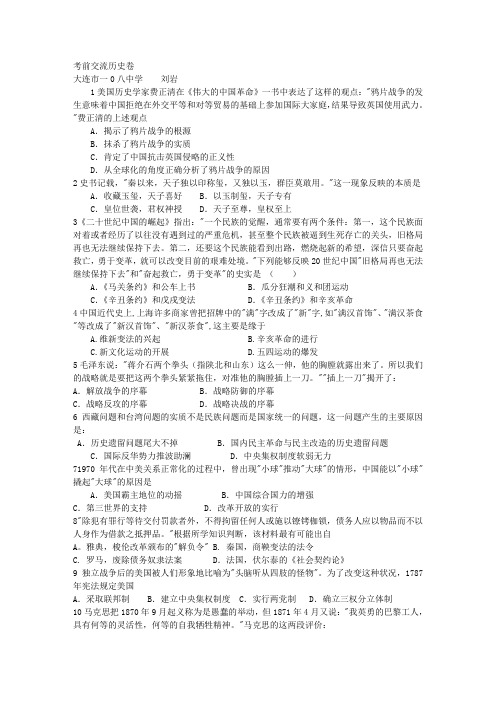
考前交流历史卷大连市一0八中学刘岩1美国历史学家费正清在《伟大的中国革命》一书中表达了这样的观点:"鸦片战争的发生意味着中国拒绝在外交平等和对等贸易的基础上参加国际大家庭,结果导致英国使用武力。
"费正清的上述观点A.揭示了鸦片战争的根源B.抹杀了鸦片战争的实质C.肯定了中国抗击英国侵略的正义性D.从全球化的角度正确分析了鸦片战争的原因2史书记载,"秦以来,天子独以印称玺,又独以玉,群臣莫敢用。
"这一现象反映的本质是 A.收藏玉玺,天子喜好 B.以玉制玺,天子专有C.皇位世袭,君权神授 D.天子至尊,皇权至上3《二十世纪中国的崛起》指出:"一个民族的觉醒,通常要有两个条件:第一,这个民族面对着或者经历了以往没有遇到过的严重危机,甚至整个民族被逼到生死存亡的关头,旧格局再也无法继续保持下去。
第二,还要这个民族能看到出路,燃烧起新的希望,深信只要奋起救亡,勇于变革,就可以改变目前的艰难处境。
"下列能够反映20世纪中国"旧格局再也无法继续保持下去"和"奋起救亡,勇于变革"的史实是()A.《马关条约》和公车上书B.瓜分狂潮和义和团运动C.《辛丑条约》和戊戌变法D.《辛丑条约》和辛亥革命4中国近代史上,上海许多商家曾把招牌中的"满"字改成了"新"字,如"满汉首饰"、"满汉茶食"等改成了"新汉首饰"、"新汉茶食",这主要是缘于A.维新变法的兴起B.辛亥革命的进行C.新文化运动的开展D.五四运动的爆发5毛泽东说:"蒋介石两个拳头(指陕北和山东)这么一伸,他的胸膛就露出来了。
所以我们的战略就是要把这两个拳头紧紧拖住,对准他的胸膛插上一刀。
""插上一刀"揭开了:A.解放战争的序幕 B.战略防御的序幕C.战略反攻的序幕 D.战略决战的序幕6西藏问题和台湾问题的实质不是民族问题而是国家统一的问题,这一问题产生的主要原因是:A.历史遗留问题尾大不掉 B.国内民主革命与民主改造的历史遗留问题C.国际反华势力推波助澜 D.中央集权制度软弱无力71970年代在中美关系正常化的过程中,曾出现"小球"推动"大球"的情形,中国能以"小球"撬起"大球"的原因是A.美国霸主地位的动摇 B.中国综合国力的增强C.第三世界的支持 D.改革开放的实行8"除犯有罪行等待交付罚款者外,不得拘留任何人或施以镣铐枷锁,债务人应以物品而不以人身作为借款之抵押品。
论费正清《美国与中国》的撰纂特点与学术影响

费正清(John King Fairbank ,简称JKF ,1907-1991年)是哈佛大学终身教授,哈佛东亚研究中心创始人,美国最负盛名的中国问题观察家,美国中国近现代史研究领域的泰斗,著名历史学家。
生前历任美国远东协会副主席、亚洲协会主席、历史学会主席、东亚研究理事会主席等重要职务,还曾是美国政府雇员、社会活动家、政策顾问。
费正清在近60年的中国问题研究生涯里,笔耕不辍,硕果累累。
其中,《美国与中国》是他的成名之作,是他的第一部比较有影响的美中关系史著作,也是一部美国东亚区域研究起始阶段的中国学著作。
该书一经面世,就因新颖的观点和有力的表达,占尽天时,立即走俏,对美国朝野产生了振聋发聩的作用,成了战后美国一般知识阶层认识中国的一本“入门书”,给了美国公众一种真切的史感和史识的体验,也为美中关系走向正常化和良性化奠下了稳固的思想认识基础。
一初版刊于1948年的《美国与中国》,与费正清的专业性极强的博士论文相比,则是海阔天空、一气呵成的著作。
该著常被误认为是一本中美外交史,事实上是一本普及性读物,一本教科书,或许还是一本中国通史,是为了使美国人认识中国而写的。
然而,严格地说来,这部书算不得历史专著,因为它涉及面太广,从政治、经济到外交的诸多领域,观点很新颖,材料也很详实。
这种销路很广、影响持续的著作效应,显然有它独特的撰纂特点。
首先,费正清以大家手笔和磅礴气势构建中国历史概要和中美关系历史过程。
在这部书中,他向他的美国读者简略地介绍了中国的自然环境、社会结构和文化传统,颇为精辟地分析了中国的农业生产、社会、政府和家庭结构以及在此基础上衍生和发展并凝固下来的儒家学说。
在有限的篇幅里分析一个几千年历史的文明内涵和4万万人口的生存方式,的确需要高屋建瓴的气势。
在书中,费正清主要对于中国的社会、政治、文化和历史提出系统的观察和论断,但详近而略远,大多数的篇幅都集中在近百年的历史发展上。
显然,全书的组织设计有两大块,即从历史的观点来认识中国的一切,再从这一认识的基础上提出对华政策的可行方案。
“中国世界秩序观”之影响及其与中国古代边疆研究

2006年3月第16卷 第1期中国边疆史地研究China’s Borderland History and G eography S tudiesMar12006V ol116N o11“中国世界秩序”观之影响及其与中国古代边疆研究———费正清《中国世界秩序:中国传统的对外关系》读后许建英 本文概述了费正清“中国世界秩序”观及其对西方中国近代史研究的影响,认为费氏的理论在中国边疆史地研究中也有着积极意义,特别是在中华民族共同意识和共同价值观的形成以及历代边疆的治理及中国疆域的确立等方面。
关键词 费正清 “中国世界秩序” 中国边疆史地研究作者许建英,1963年生,史学博士,中国社会科学院中国边疆史地研究中心副研究员。
地址:北京市王府井大街东厂胡同1号,邮编100006。
作为美国著名的中国学家,费正清在中国学研究和世界中国学建设上都做出了杰出的贡献。
在费正清研究中国对外关系的著作中,《中国世界秩序:中国传统的对外关系》是值得重视的一本书。
该书共分为14章,分别由包括费正清在内的美国历史学家、华裔历史学家、日本及韩国历史学家共同完成的。
该书不但系统研究了费正清长期关注的朝贡制度,而且正式提出并阐述了“中国世界秩序”的理论框架,对其形成、实质、演变及其在清代之状况分别进行了考察,可以说它是费氏研究朝贡制度的总结和升华。
关于费氏的这一理论,以往论者多从中国古代对外关系角度关注,笔者认为它对研究中国古代疆域的形成与演变也有着重要意义。
兹借助翻译该书的机会,对该书内容及其所涉及理论的影响做简要介绍,同时初步探讨该理论在中国古代边疆研究中的意义。
不当之处,恳请方家指正。
费正清之“中国世界秩序”观在《中国世界秩序:中国传统的对外关系》开篇中,费正清正式提出关于“中国世界秩序”的理论框架。
该框架是费正清研究中国历史,特别是中国近代史所依赖的研究取向(approach)①和思想资源。
在该理论框架中,费氏提出“中国中心主义(sinocentrism)”的概念,并概括了其基本理论和问题,阐述了该理论的起源与发展。
冲击回应模式 费正清

冲击回应模式费正清一、费正清与“冲击—回应”模式费正清是美国现代中国学研究的开拓者,他早年赴英国牛津大学攻读博士学位,曾受过英国著名汉学家马士(Hosea B. Morse)的指导,同他进行过深入交谈,③马士的《中华帝国对外关系》(The International Relations of the Chinese Empire)是根据大量英国档案和中国海关史料撰写而成,对费正清决定研究海关档案作为他的博士论文,开始从事中国近代史研究有很大影响,为他一生从事中国学研究奠定基础。
费正清来中国后又受美国汉学家拉铁摩尔(Owen Lattimore)和中国历史学家蒋廷黻的影响,拉铁摩尔地缘政治研究的许多新观点“恰好可以和费正清关于“东南沿海的贸易与外交研究”计划互相补充”④。
费正清在中国期间,在蒋廷黻指导下,致力于《筹办夷务始末》研究,以中国档案与英国档案互相堪对,蒋的外交史研究方法在观念上对费正清有重要启发,他在多年从事中国学研究中注重从外部逐渐进入中国史的内层,这对他用“冲击—回应”模式来解释中国近代史进程,无疑是一个自然的发展。
费正清的著作很多,其中《美国与中国》(The United States and China)、《中国沿海的贸易与外交:条约港口的开放》(费正清博士论文)(Trade and Diplomacy on the China Coast:The Opening of the Treaty Ports)、《中国对西方的反应》(China’s Response to the West-A Documentary Survey,1839-1923),建立了近代中国研究的基本框架和模式。
其中“冲击—回应”模式作为一个架构的核心,贯穿他中国近代史研究的始终。
无论是《美国与中国》,还是他与邓嗣禹合著的《中国对西方的反应》,对“冲击—回应”模式都作了极为深刻的论述。
在阐述西方侵略对传统中国社会产生灾难性的影响时,费正清认为,这种影响渗透到中国社会的各个领域和一系列复杂的历史进程,而且“经过三代人的更替,旧秩序已经改变模样。
冲击回应模式
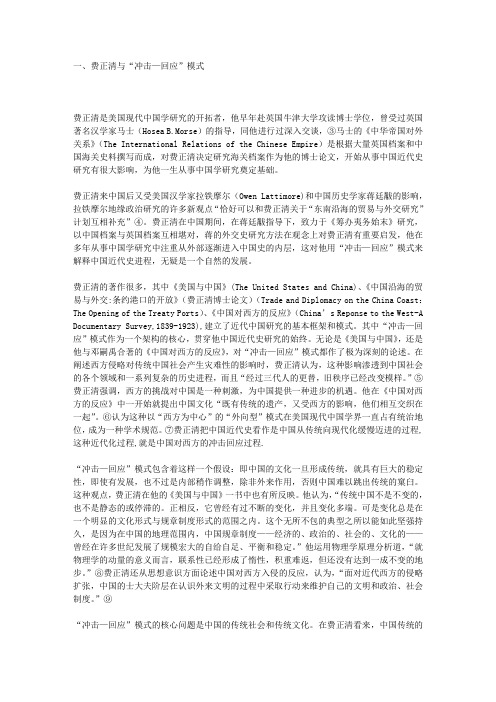
一、费正清与“冲击—回应”模式费正清是美国现代中国学研究的开拓者,他早年赴英国牛津大学攻读博士学位,曾受过英国著名汉学家马士(Hosea B.Morse)的指导,同他进行过深入交谈,③马士的《中华帝国对外关系》(The International Relations of the Chinese Empire)是根据大量英国档案和中国海关史料撰写而成,对费正清决定研究海关档案作为他的博士论文,开始从事中国近代史研究有很大影响,为他一生从事中国学研究奠定基础。
费正清来中国后又受美国汉学家拉铁摩尔(Owen Lattimore)和中国历史学家蒋廷黻的影响,拉铁摩尔地缘政治研究的许多新观点“恰好可以和费正清关于“东南沿海的贸易与外交研究”计划互相补充”④。
费正清在中国期间,在蒋廷黻指导下,致力于《筹办夷务始末》研究,以中国档案与英国档案互相堪对,蒋的外交史研究方法在观念上对费正清有重要启发,他在多年从事中国学研究中注重从外部逐渐进入中国史的内层,这对他用“冲击—回应”模式来解释中国近代史进程,无疑是一个自然的发展。
费正清的著作很多,其中《美国与中国》(The United States and China)、《中国沿海的贸易与外交:条约港口的开放》(费正清博士论文)(Trade and Diplomacy on the China Coast:The Opening of the Treaty Ports)、《中国对西方的反应》(China’s Reponse to the West-A Documentary Survey,1839-1923),建立了近代中国研究的基本框架和模式。
其中“冲击—回应”模式作为一个架构的核心,贯穿他中国近代史研究的始终。
无论是《美国与中国》,还是他与邓嗣禹合著的《中国对西方的反应》,对“冲击—回应”模式都作了极为深刻的论述。
在阐述西方侵略对传统中国社会产生灾难性的影响时,费正清认为,这种影响渗透到中国社会的各个领域和一系列复杂的历史进程,而且“经过三代人的更替,旧秩序已经改变模样。
美国著名汉学家——费正清
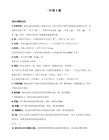
《清季史料入门》
China Administration:Three Studies(ed.with ssu—yu Teng),HUP,1960.
《清代的政府:三项研究》
East Asia:The Great Tradition(with E.O.Reischauer),HUP,1960.
1967 在剑桥①举行六十大寿庆祝会;费维恺(Albert Feuerwerker)、莫菲(Rhoads Murphey)、芮玛丽(Mary Wright)等主编的《中国近现代史入门》(由加州大学出版社出版)一书以作贺礼
1968 当选为美国历史协会主席
1972 夏天,与威尔玛重访中国
《中国:人民的中央王国与美利坚合众国》
The Chinese World Order:Traditional China’s Foreign Relations(ed.and contrib.),HUP,1968.
《中国的世界秩序:中国传统的对外关系》
New Views of China’s Tradition and Modernization,Washington, D.C,American Association Service Center for Teachers of History,1969.
2012《优化探究》历史二轮复习试题高效知能检测8
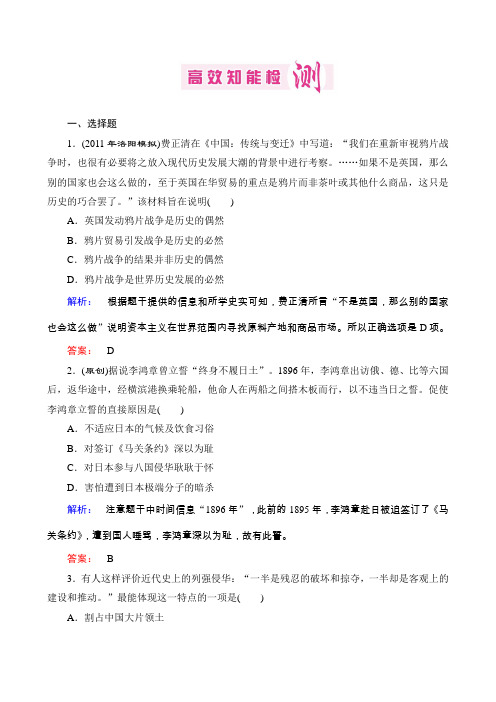
一、选择题1.(2011年洛阳模拟)费正清在《中国:传统与变迁》中写道:“我们在重新审视鸦片战争时,也很有必要将之放入现代历史发展大潮的背景中进行考察。
……如果不是英国,那么别的国家也会这么做的,至于英国在华贸易的重点是鸦片而非茶叶或其他什么商品,这只是历史的巧合罢了。
”该材料旨在说明()A.英国发动鸦片战争是历史的偶然B.鸦片贸易引发战争是历史的必然C.鸦片战争的结果并非历史的偶然D.鸦片战争是世界历史发展的必然解析:根据题干提供的信息和所学史实可知,费正清所言“不是英国,那么别的国家也会这么做”说明资本主义在世界范围内寻找原料产地和商品市场。
所以正确选项是D项。
答案: D2.(原创)据说李鸿章曾立誓“终身不履日土”。
1896年,李鸿章出访俄、德、比等六国后,返华途中,经横滨港换乘轮船,他命人在两船之间搭木板而行,以不违当日之誓。
促使李鸿章立誓的直接原因是()A.不适应日本的气候及饮食习俗B.对签订《马关条约》深以为耻C.对日本参与八国侵华耿耿于怀D.害怕遭到日本极端分子的暗杀解析:注意题干中时间信息“1896年”,此前的1895年,李鸿章赴日被迫签订了《马关条约》,遭到国人唾骂,李鸿章深以为耻,故有此誓。
答案: B3.有人这样评价近代史上的列强侵华:“一半是残忍的破坏和掠夺,一半却是客观上的建设和推动。
”最能体现这一特点的一项是()A.割占中国大片领土B.从中国掠走大量贵金属C.进行惨无人道的大屠杀D.在通商口岸投资设厂解析:A、B、C三项仅体现了列强侵略给中国带来的破坏和掠夺;列强在通商口岸投资设厂,一方面是经济上对中国的侵略,是残忍的破坏和掠夺,然而西方列强的侵略,使中国传统的经济结构发生了变化,促使中国民族资本主义的产生,客观上促进了中国社会的进步,D项正确。
答案: D4.在“关于太平天国运动的历史意义”讨论课上,部分同学提出了“太平天国运动不利于中国近代化”的想法。
以下内容可以支持他们论点的有()①太平天国运动破坏了富饶地区的生产力,迟滞了中国近代化进程②太平天国颁布了要求发展资本主义的《资政新篇》③太平天国运动加速了清王朝和封建制度的衰落与崩溃④《天朝田亩制度》实为农民阶级不切实际的空想,与当时世界资本主义发展的潮流背道而驰,是历史的倒退A.①②③④B.①③C.①④D.②③④解析:本题可以采用错误项代入排除法。
费正清与美国的中国学
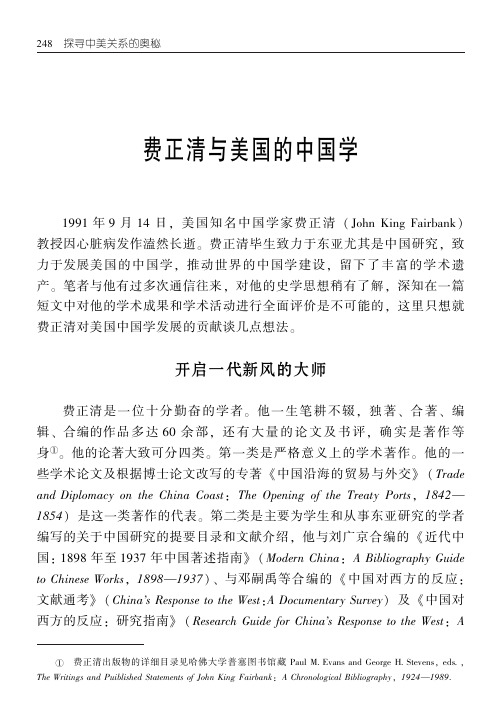
842 探寻中美关系的奥秘费正清与美国的中国学1991年9月14日,美国知名中国学家费正清(John King Fairbank)教授因心脏病发作溘然长逝㊂费正清毕生致力于东亚尤其是中国研究,致力于发展美国的中国学,推动世界的中国学建设,留下了丰富的学术遗产㊂笔者与他有过多次通信往来,对他的史学思想稍有了解,深知在一篇短文中对他的学术成果和学术活动进行全面评价是不可能的,这里只想就费正清对美国中国学发展的贡献谈几点想法㊂开启一代新风的大师费正清是一位十分勤奋的学者㊂他一生笔耕不辍,独著㊁合著㊁编辑㊁合编的作品多达60余部,还有大量的论文及书评,确实是著作等身①㊂他的论著大致可分四类㊂第一类是严格意义上的学术著作㊂他的一些学术论文及根据博士论文改写的专著‘中国沿海的贸易与外交“(Trade and Diplomacy on the China Coast:The Opening of the Treaty Ports,1842 1854)是这一类著作的代表㊂第二类是主要为学生和从事东亚研究的学者编写的关于中国研究的提要目录和文献介绍,他与刘广京合编的‘近代中国:1898年至1937年中国著述指南“(Modern China:A Bibliography Guide to Chinese Works,1898 1937)㊁与邓嗣禹等合编的‘中国对西方的反应:文献通考“(China’s Response to the West:A Documentary Survey)及‘中国对西方的反应:研究指南“(Research Guide for China’s Response to the West:A ①费正清出版物的详细目录见哈佛大学普塞图书馆藏Paul M.Evans and George H.Stevens,eds., The Writings and Puiblished Statements of John King Fairbank:A Chronological Bibliography,1924 1989.Documentary Survey ,1839 1923)是这一类著作的代表㊂第三类是为教育广大公众写作的关于中国及中美关系的著作,其中最广为人知的当属‘美国与中国“(The United States and China )㊂从篇幅上说,第三类著述在他的全部著作中占的分量最大㊂这类著作依据的是第二手资料,是充分吸收最新研究成果,并把这些成果融会贯通在费正清自己的解释框架之中的产物㊂第四类是直接论述中美关系㊁提出政策建议的文章㊂这些文章与一般的时评文章不同㊂他总是从历史与现实的结合上来阐述问题,论述当前问题的历史背景和来龙去脉,而不是就事论事㊂这些论文在发表以后多被汇集成册,如‘中国:人民的中央王国和美国“(China :The People’s Middle Kingdom and the U .S .A )㊁‘认识中国:中美关系中的形象与政策“(China Perceived :Images and Policies and Chinese⁃American Relations )等㊂总览费正清的上述著作,有以下两个明显特征㊂第一,经世致用的史学思想和实践㊂传统欧洲的汉学是以中国语言文化为主要研究对象的㊂这似乎是一种象牙塔中的学问,是为研究而研究,为学术而学术㊂当然这种为求知而求知也是需要的㊂但费正清的学术思想和实践与他们根本不同㊂他没有系统阐述过他的学术思想,但在1968年任第八十三届美国历史学会会长的演说中,他毫不讳言自己是主张经世治国的①㊂他相信, 研究应当具有实际的效用”, 学者的责任不仅在于增加知识,而且在于教育公众,在于影响政策”㊂他在自己毕生的学术研究中始终强调历史与现实的联系,强调学术研究与现实政治的关系㊂他也以这种观念影响他的学生,使他们感到自己肩负着把老师的这种 较少狭隘性而较好准备着了解东亚的自由的㊁现实的美国观念发扬光大”的责任②㊂这是他的特殊经历及所处的特殊时代所造成的㊂费正清在牛津完成了他的博士论文后即返回哈佛任教,并从1939年起与赖肖尔(Edwin O.Reischauer)一起开设东亚文明课程㊂如果没有太平洋战争,他也许会在哈佛安安稳稳地做学者㊂但在太平洋战争爆发前4个942费正清与美国的中国学 ①②陶文钊编选,林海㊁符致兴等译:‘费正清集“,天津人民出版社1993年版,第405页㊂Paul A.Cohen and Merle Goldman,eds.,Fairbank Remembered (Published by John King Fairbank Center,Harvard University and distributed by the Harvard University Press,Cambridge and London),pp.125,179.月,他被征召到情报协调局(战略情报局前身)工作,1942年9月至1943年12月在中国担任战略情报局官员并兼美国驻华大使特别助理㊂这一职务使他有机会比较广泛和深入地观察中国社会,了解中国实际㊂他看到国统区通货膨胀严重,人民生活艰难,政府效能低下,官员文恬武嬉,知识阶层对现政权强烈不满,所有这些与国民党在海外进行的宣传相去甚远㊂他认为,国民党的统治 气数已尽,民心尽失”㊂这与当时美国驻华大使馆政治官员谢伟思(John S.Service)㊁戴维斯(John P.Davis)等的看法不谋而合㊂同时他积极主张派美军观察组去延安,并与中共驻重庆办事处人员保持着良好的关系㊂他1944年回国时带回去的主要信念是:中国的革命运动是中国现实生活的内在产物,它不是CC系和戴笠的军统特务们的高压所能扑灭的㊂蒋介石拿不出什么能与之抗衡的思想武器㊂正如他在给国务院的一个报告中所说的:我们必须等待伟大的中国革命有朝一日终将发生①㊂但当时了解中国实际情况的美国人太少了㊂而且恰恰是在1944年至1945年的冬春,在赫尔利(Patrick J.Hurley)来华之后美国越来越偏向于片面支持国民党,其对华政策由战时的扶蒋容共抗日向战后的扶蒋反共转变㊂1945年10月费正清再度来华,担任美国新闻署驻华分署主任,直至1946年7月㊂他亲眼看到国民党官员在接收中大发横财,以及国民党的腐败和愈演愈烈的通货膨胀使以前支持国民党的上层阶级也与国民党离心离德㊂1946年7月,著名民主人士李公朴㊁闻一多先后遭国民党特务暗杀㊂费正清在战争期间就与西南联大的教授们有着特殊的联系,认为他们 代表了美国在华的一种投资和财富”, 是美国在华利益的象征”②㊂李㊁闻遇难使他深感震惊,也使他对国民党的统治彻底失望㊂他愤然撰文,谴责国民党的 倒行逆施”和 强盗行径”,同时指出,美国的对华政策正 面临着两难的选择”: 革命将危及我们的自由主义的利益,然而反动更是现时就破坏这种利益 我们似乎宁要反动的种种已知的罪恶,而不要052 探寻中美关系的奥秘①②费正清:‘费正清对华回忆录“,陆惠勒等译,章克生校,上海知识出版社1991年版,第301㊁338㊁341等页㊂‘费正清对华回忆录“,第225页;‘费正清集“,第308页㊂。
学术著作翻译的方法——以费正清的著作翻译为例
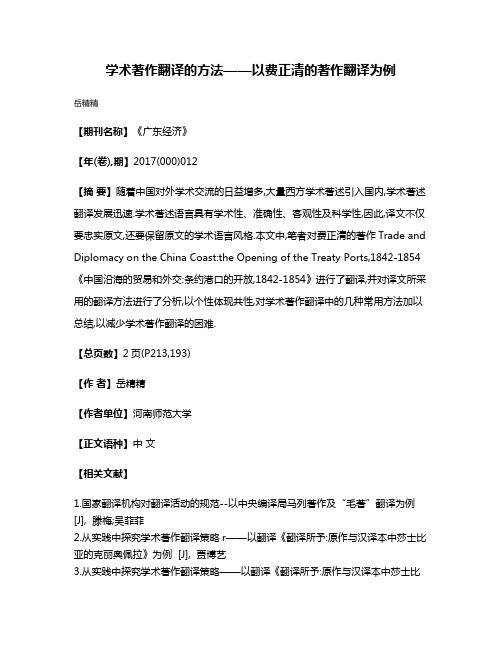
学术著作翻译的方法——以费正清的著作翻译为例
岳精精
【期刊名称】《广东经济》
【年(卷),期】2017(000)012
【摘要】随着中国对外学术交流的日益增多,大量西方学术著述引入国内,学术著述翻译发展迅速.学术著述语言具有学术性、准确性、客观性及科学性,因此,译文不仅要忠实原文,还要保留原文的学术语言风格.本文中,笔者对费正清的著作Trade and Diplomacy on the China Coast:the Opening of the Treaty Ports,1842-1854《中国沿海的贸易和外交:条约港口的开放,1842-1854》进行了翻译,并对译文所采用的翻译方法进行了分析,以个性体现共性,对学术著作翻译中的几种常用方法加以总结,以减少学术著作翻译的困难.
【总页数】2页(P213,193)
【作者】岳精精
【作者单位】河南师范大学
【正文语种】中文
【相关文献】
1.国家翻译机构对翻译活动的规范--以中央编译局马列著作及“毛著”翻译为例[J], 滕梅;吴菲菲
2.从实践中探究学术著作翻译策略r——以翻译《翻译所予:原作与汉译本中莎士比亚的克丽奥佩拉》为例 [J], 贾博艺
3.从实践中探究学术著作翻译策略——以翻译《翻译所予:原作与汉译本中莎士比
亚的克丽奥佩拉》为例 [J], 贾博艺
4.学术著作中人名翻译的基本前提、基本原则与基本方法——以《新帕尔格雷夫经济学大辞典》(中文第二版)人名翻译为例 [J], 江月
5.从实践中探究学术著作翻译策略——以翻译《翻译所予:原作与汉译本中莎士比亚的克丽奥佩拉》为例 [J], 贾博艺
因版权原因,仅展示原文概要,查看原文内容请购买。
冲击回应形式[评析]
![冲击回应形式[评析]](https://img.taocdn.com/s3/m/6823d51e773231126edb6f1aff00bed5b8f37352.png)
冲击回应模式一、费正清与“冲击—回应”模式费正清是美国现代中国学研究的开拓者,他早年赴英国牛津大学攻读博士学位,曾受过英国著名汉学家马士(Hosea B.Morse)的指导,同他进行过深入交谈,③马士的《中华帝国对外关系》(The International Relations of the Chinese Empire)是根据大量英国档案和中国海关史料撰写而成,对费正清决定研究海关档案作为他的博士论文,开始从事中国近代史研究有很大影响,为他一生从事中国学研究奠定基础。
费正清来中国后又受美国汉学家拉铁摩尔(Owen Lattimore)和中国历史学家蒋廷黻的影响,拉铁摩尔地缘政治研究的许多新观点“恰好可以和费正清关于“东南沿海的贸易与外交研究”计划互相补充”④。
费正清在中国期间,在蒋廷黻指导下,致力于《筹办夷务始末》研究,以中国档案与英国档案互相堪对,蒋的外交史研究方法在观念上对费正清有重要启发,他在多年从事中国学研究中注重从外部逐渐进入中国史的内层,这对他用“冲击—回应”模式来解释中国近代史进程,无疑是一个自然的发展。
费正清的著作很多,其中《美国与中国》(The United States and China)、《中国沿海的贸易与外交:条约港口的开放》(费正清博士论文)(Trade and Diplomacy on the China Coast:The Opening of the Treaty Ports)、《中国对西方的反应》(China’s Reponse to the West-A Documentary Survey,1839-1923),建立了近代中国研究的基本框架和模式。
其中“冲击—回应”模式作为一个架构的核心,贯穿他中国近代史研究的始终。
无论是《美国与中国》,还是他与邓嗣禹合著的《中国对西方的反应》,对“冲击—回应”模式都作了极为深刻的论述。
在阐述西方侵略对传统中国社会产生灾难性的影响时,费正清认为,这种影响渗透到中国社会的各个领域和一系列复杂的历史进程,而且“经过三代人的更替,旧秩序已经改变模样。
矿产
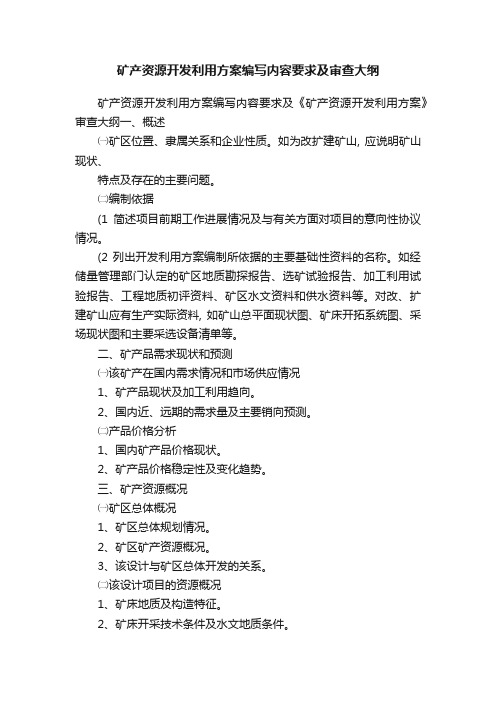
矿产资源开发利用方案编写内容要求及审查大纲
矿产资源开发利用方案编写内容要求及《矿产资源开发利用方案》审查大纲一、概述
㈠矿区位置、隶属关系和企业性质。
如为改扩建矿山, 应说明矿山现状、
特点及存在的主要问题。
㈡编制依据
(1简述项目前期工作进展情况及与有关方面对项目的意向性协议情况。
(2 列出开发利用方案编制所依据的主要基础性资料的名称。
如经储量管理部门认定的矿区地质勘探报告、选矿试验报告、加工利用试验报告、工程地质初评资料、矿区水文资料和供水资料等。
对改、扩建矿山应有生产实际资料, 如矿山总平面现状图、矿床开拓系统图、采场现状图和主要采选设备清单等。
二、矿产品需求现状和预测
㈠该矿产在国内需求情况和市场供应情况
1、矿产品现状及加工利用趋向。
2、国内近、远期的需求量及主要销向预测。
㈡产品价格分析
1、国内矿产品价格现状。
2、矿产品价格稳定性及变化趋势。
三、矿产资源概况
㈠矿区总体概况
1、矿区总体规划情况。
2、矿区矿产资源概况。
3、该设计与矿区总体开发的关系。
㈡该设计项目的资源概况
1、矿床地质及构造特征。
2、矿床开采技术条件及水文地质条件。
- 1、下载文档前请自行甄别文档内容的完整性,平台不提供额外的编辑、内容补充、找答案等附加服务。
- 2、"仅部分预览"的文档,不可在线预览部分如存在完整性等问题,可反馈申请退款(可完整预览的文档不适用该条件!)。
- 3、如文档侵犯您的权益,请联系客服反馈,我们会尽快为您处理(人工客服工作时间:9:00-18:30)。
矿产资源开发利用方案编写内容要求及审查大纲
矿产资源开发利用方案编写内容要求及《矿产资源开发利用方案》审查大纲一、概述
㈠矿区位置、隶属关系和企业性质。
如为改扩建矿山, 应说明矿山现状、
特点及存在的主要问题。
㈡编制依据
(1简述项目前期工作进展情况及与有关方面对项目的意向性协议情况。
(2 列出开发利用方案编制所依据的主要基础性资料的名称。
如经储量管理部门认定的矿区地质勘探报告、选矿试验报告、加工利用试验报告、工程地质初评资料、矿区水文资料和供水资料等。
对改、扩建矿山应有生产实际资料, 如矿山总平面现状图、矿床开拓系统图、采场现状图和主要采选设备清单等。
二、矿产品需求现状和预测
㈠该矿产在国内需求情况和市场供应情况
1、矿产品现状及加工利用趋向。
2、国内近、远期的需求量及主要销向预测。
㈡产品价格分析
1、国内矿产品价格现状。
2、矿产品价格稳定性及变化趋势。
三、矿产资源概况
㈠矿区总体概况
1、矿区总体规划情况。
2、矿区矿产资源概况。
3、该设计与矿区总体开发的关系。
㈡该设计项目的资源概况
1、矿床地质及构造特征。
2、矿床开采技术条件及水文地质条件。
